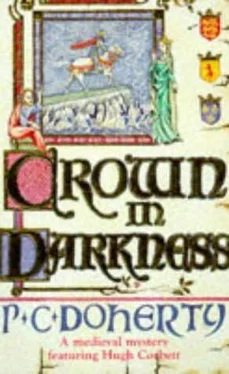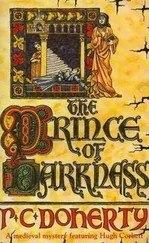Paul Doherty - Crown in Darkness
Здесь есть возможность читать онлайн «Paul Doherty - Crown in Darkness» весь текст электронной книги совершенно бесплатно (целиком полную версию без сокращений). В некоторых случаях можно слушать аудио, скачать через торрент в формате fb2 и присутствует краткое содержание. Жанр: Исторический детектив, на английском языке. Описание произведения, (предисловие) а так же отзывы посетителей доступны на портале библиотеки ЛибКат.
- Название:Crown in Darkness
- Автор:
- Жанр:
- Год:неизвестен
- ISBN:нет данных
- Рейтинг книги:4 / 5. Голосов: 1
-
Избранное:Добавить в избранное
- Отзывы:
-
Ваша оценка:
- 80
- 1
- 2
- 3
- 4
- 5
Crown in Darkness: краткое содержание, описание и аннотация
Предлагаем к чтению аннотацию, описание, краткое содержание или предисловие (зависит от того, что написал сам автор книги «Crown in Darkness»). Если вы не нашли необходимую информацию о книге — напишите в комментариях, мы постараемся отыскать её.
Crown in Darkness — читать онлайн бесплатно полную книгу (весь текст) целиком
Ниже представлен текст книги, разбитый по страницам. Система сохранения места последней прочитанной страницы, позволяет с удобством читать онлайн бесплатно книгу «Crown in Darkness», без необходимости каждый раз заново искать на чём Вы остановились. Поставьте закладку, и сможете в любой момент перейти на страницу, на которой закончили чтение.
Интервал:
Закладка:
Wishart rose and crossed the darkened chamber to secure one of the wooden shutters. He turned and warmed his hands over a small charcoal brazier. The French, he thought, were a different matter; their envoy, de Craon, was already in Scotland, plotting and conspiring with that bitch of a widow-queen. Wishart rubbed his hands together, cracking his knuckles as he tried to control his anger. He had never liked Queen Yolande with her haughty airs and fastidious manner, locking herself up at Kinghorn Manor and keeping away from the King. Alexander was, allegedly, infatuated with her but there was something wrong. She was supposed to be pregnant and perhaps Scotland might still get its heir but would it be a male prince and who would protect him over the coming years? Wishart sighed deeply. Then, of course, there were the Bruces, Lord Bruce who should be preparing himself for death instead of being involved in politics as if he were some young courtier intent on rising as fast and as far as he could.
Wishart thought back to what he had heard about that fateful night at the banquet. Bruce had been there, so had the English and French envoys. De Craon had looked upset. Benstede, impassive, had left early, while Bruce scarcely bothered to disguise the murder in his eyes whenever he caught the King's glance. The King had been so glum on his arrival and then, suddenly, almost out of character even for him, his mood had changed to one of enjoyment, drinking deeply, boasting that he would be with the Queen before the night was out, then off riding into that terrible storm to his death on the top of Kinghorn Cliff. Was someone there waiting for him, Wishart thought? No. No one at the banquet could possibly have crossed the Firth of Forth in such weather with such speed and he knew from his own spies that only the King had crossed the Forth that night. Deep in his heart Wishart believed the King had been murdered but he did not know how, or why, or by whom. The old bishop stirred restlessly as the wind howled in savage gusts against the castle and, although they had never met, he would have agreed with Corbett: Satan was abroad, his evil gathering like pus in an open wound.
FIVE
The next morning Corbett slept late, deaf to the sound of the abbey bells, and the normal bustle of the monks as they went about their various activities. He was awakened just before noon by the Master of Novices who announced that a message had come from John Benstede asking for Corbett to present himself at the castle immediately. Corbett hurriedly dressed, refused the kind offer of a horse but accepted the services of a guide to take him through Edinburgh to the castle. They set off through the drizzling rain, climbing the steep path up the rock which the monks said was popularly known as Arthur's Seat. Edinburgh was totally different from London; a royal burgh, it was built according to some sort of plan: long narrow streets with timbered and stone houses on either side, some joined together, others separated by narrow runnels or alleyways which led to a small garden or croft behind each tenement. There were shops, simple open-fronted affairs, booths and numerous ale-houses. Corbett thought London was dirty but Edinburgh was filthy; rubbish, the remains of meals, broken chamberpots, even corpses of dead animals littered the streets.
The noise was intense with carts trundling across the rutted tracks or wynds as Corbett's guide described them. Business was brisk, shopkeepers even running out to grab
Corbett by the arm and offer a pie, a piece of cloth, fresh fish from the Firth, almonds, nuts and raisins brought in from the nearby port of Leith. Corbett could hardly understand their accent and was thankful for the stout staff his guide carried and so expertly used to make their way through the milling crowd. They passed the ancient church of St. Giles, and crossed a wide open grassy space which the guide called the Lawnmarket, the vast expanse generally used for markets or fairs. It was also the execution ground and the decomposing bodies of four criminals twirled from the makeshift gibbet.
They continued on, up the steep incline and into the castle. Inside, the scene was one of frenetic confusion, servants scurrying around, shouting and gesticulating, carts laden with provisions struggling to either get in or leave. Horses rearing and neighing, as ostlers and stable-boys tried to calm them down and lead them away. Men-at-arms, wearing the royal livery of Scotland, attempted to impose some form of order but the situation was not improved by a horde of courtiers standing around also issuing their instructions to a vast army of retainers all wearing different liveries. Corbett turned to his guide to ask what was happening but found the man had had enough sense and discretion to depart as quickly as possible. Corbett grabbed a groom who was trying to lead a horse to the stables at the far end of the bailey but the fool could not understand him and Corbett simply drew a blank look, followed by a shrug and muttered curses.
The English clerk stood rooted to the ground, wondering whether to stay or leave, when a hand gently touched his shoulder and he turned to see John Benstede, his kind face wrinkled in an apologetic smile. 'Master Clerk,' he said quietly. 'It was good of you to arrive so promptly. Come, let us leave this chaos.' Corbett followed him across the yard as the English envoy made his way carefully through the throng and up a flight of steep stairs into the main keep of the castle. Up another row of stairs and Corbett followed Benstede into a small, grim chamber with a bed of straw in the corner, a trestle table, a badly-lit brazier and a few rough stools for comfort. Benstede sighed and gestured to Corbett to sit down while he slumped, head on hand, on a stool near the table. 'What is the matter?1 Corbett asked. 'Why the summons and why the confusion?' 'The Council of Guardians,' Benstede replied wearily, 'has called a meeting of the Great Council. We are not summoned to that but to the great banquet afterwards. The Chancellor, Bishop Wishart of Glasgow, has instructed all foreign envoys to attend this feast.' He poured a cup of watered wine for Corbett and then joined him, sipping carefully while studying the English clerk. 'You have been busy, Master Corbett?' he enquired. 'Yes,' Corbett replied tactfully. 'I have been trying to elicit what is happening in Scotland. Both our King and the Chancellor,' he lied, 'will be grateful for any information.' 'And have you discovered anything?' 'No,' Corbett lied again. 'Alexander III is dead, killed when his horse went over Kinghorn Ness. I have presented the Chancellor's condolences to his widow and now I must stay until I receive fresh instructions.' 'You are interested in Alexander Ill's death?' Benstede persisted. 'Do you think there was foul play?' 'I think,' Corbett replied carefully, 'that the King's death was mysterious and worthy of study.' Benstede pursed his lips and let out a long sigh. 'Be careful, Master Clerk,' he said. 'The Scots are in no mood to have foreigners, or Sassenachs as they call us, interfering in their affairs, but by all means keep yourself conversant with what is happening. Our Sovereign Lord King,' he commented sardonically, 'is always ready to listen to gossip from foreign courts.' Corbett decided to ignore the sarcastic tone and refused to be drawn. He stared at his companion's round cherubic face and twinkling blue eyes and knew that Benstede was only trying to draw him into conversation. 'What is the council meeting about?' he asked. Benstede got up and crossed to the bed in the far corner. He lifted the straw mattress and pulled out a small leather pouch which Corbett recognised as being in common use by clerks in the Chancery or envoys on their travels. Benstede inspected and then broke the seal and handed a small roll of vellum to Corbett. 'Read this,' he said. 'A draft copy of my report to the King. It describes the situation in Scotland as I see it and contains nothing confidential!' He grinned sideways at Corbett. 'At least, nothing yet! Go ahead! Read it!' Corbett unrolled the letter and ignored the usual introductory courtesies – "John Benstede to his Grace, etc. etc. The news from the Scottish court is this. His Grace, King Alexander III, was killed when he plunged from Kinghorn Ness on the night of the 18th March. It is commonly rumoured that the King was on his way to stay with his new wife, Queen Yolande, at a nearby manor. A great grief has fallen upon the kingdom and there is deep apprehension for the future. As your Grace knows, Alexander was married to your Grace's late lamented sister, Margaret. The issue of that marriage, the Princes Alexander and David, are dead. The only surviving issue is a granddaughter, Margaret, commonly called the Maid of Norway, offspring of Eric II of Norway, who married Alexander Ill's only surviving daughter. Margaret is a girl of only three years and is not of suitable age to take over this kingdom. Nevertheless, at Scone on the 5th February 1284, Alexander made all the estates of Scotland bind themselves by oath to acknowledge the Maid of Norway as his heir, failing any children Alexander might have in the future. Envoys have already been sent to the Norwegian court to apprise King Eric of the circumstances and to beg him to send the Maid back to Scotland as soon as possible.
Читать дальшеИнтервал:
Закладка:
Похожие книги на «Crown in Darkness»
Представляем Вашему вниманию похожие книги на «Crown in Darkness» списком для выбора. Мы отобрали схожую по названию и смыслу литературу в надежде предоставить читателям больше вариантов отыскать новые, интересные, ещё непрочитанные произведения.
Обсуждение, отзывы о книге «Crown in Darkness» и просто собственные мнения читателей. Оставьте ваши комментарии, напишите, что Вы думаете о произведении, его смысле или главных героях. Укажите что конкретно понравилось, а что нет, и почему Вы так считаете.












